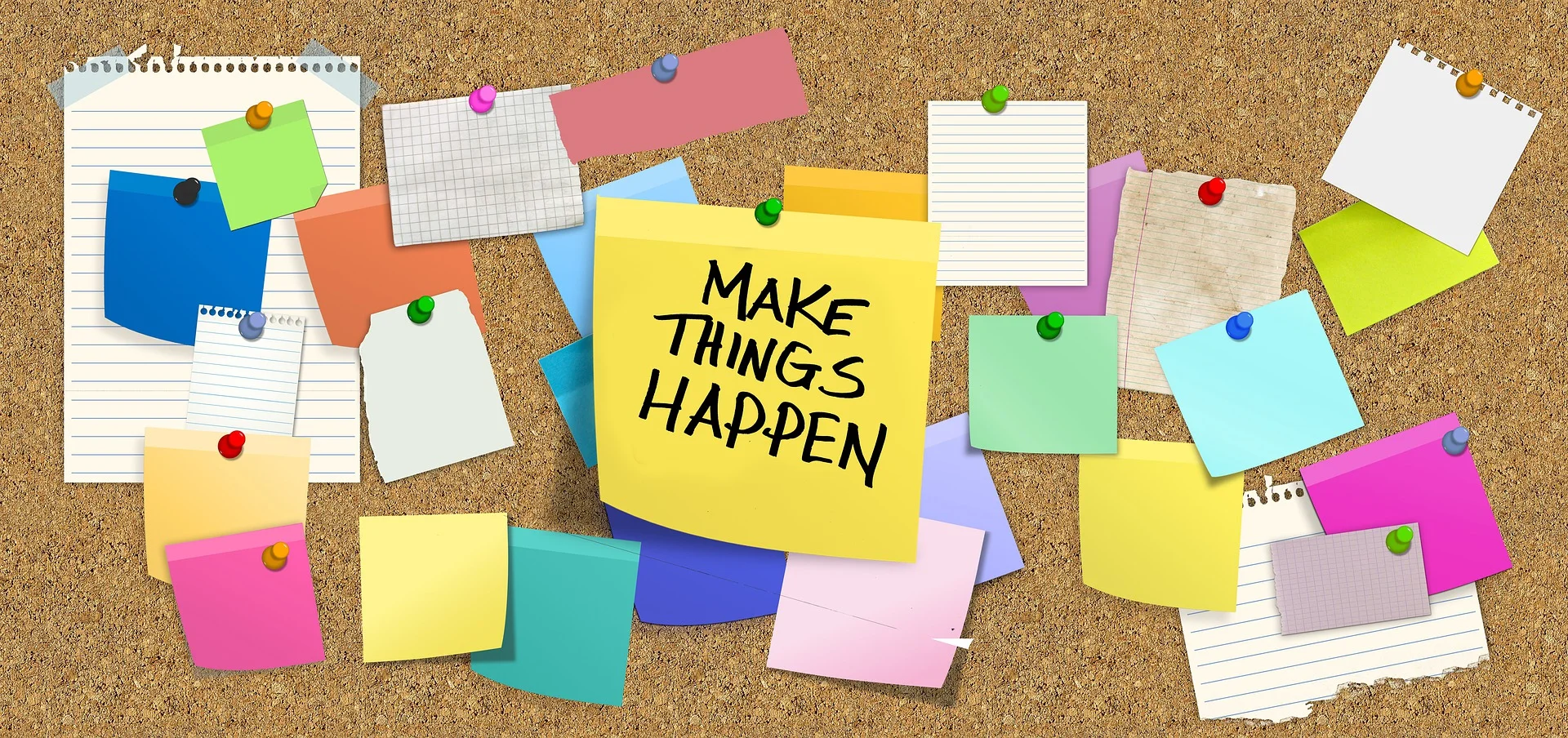Realistically Setting Goals
This is the final installment in my series on New Year, New Mind. I’ve been discussing how our thoughts can easily derail our efforts to form habits that will make us healthier people, not only physically, but mentally and emotionally. Last week I looked at a few ways to stop our train wreck mentalities and this week, I wanted to close with a look at realistically setting goals.
Pixabay
Baby Steps
The best way to start when setting goals is by starting with small steps. Rather than starting large and working your way back, start small and work your way up.
For example, if you want to get organized, but don’t know where to start, decide what your first priority is. If you need to work on meal planning, start by having a plan for at least three meals a week. Rather than being overwhelmed with a whole week, just plan a few and write them down. If you and your spouse both work and can afford the service, there are a number of food services now available that deliver all the ingredients and directions for meal prep to your door for as many meals a week as you want. My daughter and her husband use Blue Apron and have three meals a week delivered. All they have to do is open the box, take out the ingredients and follow the directions. There are lots of options available.
Perhaps you want to improve your health by exercising, and eating better. Instead of going cold turkey off all your favorite treats, start with a few small changes. Drinking more water, adding a veggie at lunch or a fruit at breakfast, eating one less meal out a week, or measuring out the potato chips so you only get one serving are all good baby steps to a healthier lifestyle. If you don’t want to invest the time or money in a gym membership there are plenty of videos on youtube.com . You can find pretty much anything to suit your lifestyle from short 20 minute walking videos to longer cardio to yoga and stretching.
Starting small allows you to see success quickly and will keep you from getting discouraged that you aren’t seeing results right away. Each step you take towards achieving a goal, is a step in the right direction, even if it is only a baby step.
Get Organized
This could be a problem, if one of your goals is to get organized. Ha, ha. I personally struggle with organization, not because I am incapable of being organized, but because I allow life to overwhelm me. Busyness, and fatigue have put a dent in my organizational capabilities. However, I know that being more organized will help with the busyness and chaos of life. Over the course of time I have come to see the following habits help life run more smoothly.
Meal plan. Planning out a weeks worth of meals help when you are grocery shopping, and when you are trying to figure out what to make for dinner. I used to do this more frequently when my girls were young and keep trying to get back to it. It saves money, time and your sanity when life gets busy. Meal planning is also helpful, when you are trying to lose weight.
Pixabay
Get up earlier. I know this is very hard for some people. I am a morning person and have the most energy before lunch. My hubby on the other hand could well be diagnosed with morning sickness. He abhors morning. Getting up earlier, gives you more time to get exercise, read your Bible, meditate and just get ready for the day ahead. This is especially important when you work and you have to get lunches made and help others get their days started as well. Start small, taking a baby step in that direction by getting up 15 minutes earlier. Gradually you might be able to work up to a half hour or more.
Pixabay
Invest in a good planner. I am a geek, so I love being able to get a new planner every year. If you get one with lots of spaces, you can use it for many purposes. You can put your meal planning in there, your appointments, work schedule and so on. A planner is a great way to keep you organized, the trick is to actually write things down in it. Ha, ha. I speak from experience!
Pixabay
“Getting organized in the normal routines of life and finishing little projects you’ve started is an important first step toward realizing larger goals. If you can’t get a handle on the small things, how will you ever get it together to focus on the big things? ”
Have a Plan
I have found the thing that helps me most in achieving my goals is to have some sort of a plan. It doesn’t have to be written in stone and signed in blood, because, let’s face it, real life often interferes with our plans. A plan that has some amount of flex to it is probably the best way to approach goal setting that will succeed.
For instance, when I want to lose weight, I come up with a plan. I decide on a way to keep track of my calories, because i have found calorie counting the best thing for me. It holds me accountable and lets me see my progress. I download a fitness app on my phone. I use a combination of Fitbit and MyFitnessPal. I also try to do more meal planning. As I said earlier, meal planning makes it easier to keep to a daily calorie goal.
Having a plan for any area of goal setting will help you succeed. Whether you make a daily plan, like keeping a list of things to do, or a weekly plan such as exercising three times or a monthly plan like getting rid of 10 items I no longer use, planning will produce results much more readily than no plan at all.
Here are a few questions to ask yourself as you develop a plan:
What do I want to accomplish?
When do I want to accomplish this by?
How am I going to accomplish this?
What sort of resources do I need to invest in to accomplish this goal?
How will I handle failure?
That question leads me to my last point.
Handle Failure Positively
Failing at anything is hard. We live in a society that condemns failure and honors success. Obviously, success is the goal. We want to be successful at whatever goals we have, but the truth is that failure is inevitable. If your goal is to lose weight, you will fall off the wagon. You’ll have a bad day and give in to those cravings for ice cream. When your goal is to declutter because you have been binge watching Tidying Up with Marie Kondo, you will end up at the mall scouring the sale racks at your favorite store, because things are marked down to less than five dollars. Maybe your goal is to be more patient with your family. Be assured they will push all your buttons before the day is over. This is real life.
One of my faithful subscribers said it best:
“...instead of letting a day, or even a couple weeks, of a blown resolution or new effort derail us or cause us to give up completely, why not get up and get started again. Keep moving forward.”
We all need to hear things like this and this leads me to several thoughts about failure.
Failure thrives on Fear
Fear is perhaps one of the biggest factors in keeping us from getting back up and starting over when we have failed.
“I can’t do it. If I try, I’ll only fail again.”
Sound familiar? Stop being afraid. Failure is not your master! Many who have gone before us recognized this fact.
“Failure is simply the opportunity to begin again, this time more intelligently.”
“Success is not final, failure is not fatal: it is the courage to continue that counts.”
“I have not failed. I’ve just found 10,000 ways that won’t work.”
“You build on failure. You use it as a stepping stone. Close the door on the past. You don’t try to forget the mistakes, but you don’t dwell on it. You don’t let it have any of your energy, or any of your time, or any of your space. ”
I could go on with amazing quotes from amazing people who went toe to toe with failure. Reading these encouraged my heart and I hope they do for you to. Failure is but a stepping stone to achieving the goals we have set. Start believing that.
Failure abhors Friendship
Have you ever noticed when we fail, we want to be alone in our misery and throw ourselves a little pity party? Surrounding ourselves with good friends can turn failure into fuel. As I stated early, I have several subscribers that often comment on my posts, sharing their enthusiasm for fashion or their struggles as they walk the road of life and faith. This means so much to me and gives me fuel to keep going, to keep trying, even when I fail.
You don’t have to have a boat load of friends to be fueled by your failure. One good friend, or your spouse can be the one to reach down when you have fallen to help you back up. If your support system is limited go to Jesus. I have certain scriptures I return to again and again, like old friends, when I need encouragement or help getting back up.
“Therefore there is now no condemnation for those who are in Christ Jesus.”
“For I am confident of this very thing, that He who began a good work in you will perfect it until the day of Christ Jesus.”
“But He knows the way I take; When He has tried me, I shall come forth as gold.”
“Have I not commanded you? Be strong and courageous! Do not tremble or be dismayed, for the Lord your God is with you wherever you go.””
I hope this series on changing our thoughts has been helpful to you. The things I have written about in this series are just my opinions. I am not a licensed counselor, just a woman who has dealt with the failure mind set in my own life. I write as much to myself as to you, so I hope this was helpful.
Have a wonderful weekend and let me know your thoughts in the comments.


















